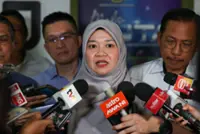PETALING JAYA: Schools implementing the Dual Language Programme (DLP) must fulfil all criteria, including students’ mastery of Bahasa Melayu (BM), says the Education Minister.
Fadhlina Sidek said this was in view of field visits made by the Education Ministry, which showed that there were students in DLP schools who did not achieve a basic level of proficiency in BM and their mother tongue.
“Schools that adopt the DLP need to ensure that its implementation does not hinder other students’ access to learning Science and Mathematics in the national language or mother tongue,” she said, citing the ministry’s DLP implementation guidelines for 2021 dated Nov 26, 2020.
At the same time, the mastery of the mother tongue was essential for ensuring its effective incorporation in vernacular schools, she added.
In a statement yesterday, Fadhlina expressed the ministry’s commitment to continue striving to dignify the mastery of BM and improve the quality of English language teaching.
Her comments came following a press conference on Dec 19 where stakeholders aired their concerns about the latest requirement for the implementation of the DLP.
At the conference, MCA Youth secretary-general Saw Yee Fung revealed that full-DLP school officials had been told to include a mandatory non-DLP class in the next academic year as part of the criteria to hold the DLP.
“While there have been no official documents or directives, DLP school principals have informed us that Education Ministry officers have communicated to them that the new guidelines are to be imposed next year.
“But not all schools have the resources to open up another new class, which would lead to a DLP class being sacrificed,” she had said.
In her statement, Fadhlina said the management of the DLP implementation was through the respective State Education Departments (JPN).
“Schools are allowed to open more than one DLP class for Year One and Form One students based on the school’s readiness and assessment by the District Education Office (PPD) and the JPN.
“The approval of the DLP implementation is subject to the ministry’s decision based on a case-by-case basis.
“The ministry takes a humane approach, that is, students from the existing cohort are still allowed to continue with DLP classes.
“However, schools need to comply with existing guidelines for the new cohort of Year One and Form One students in the 2024/2025 session,” she said.
The Minister added that the JPN was also responsible for mapping the “acceptor” secondary schools to ensure that each student cohort could continue learning in DLP classes at the secondary level.
“The ministry will continue to monitor and provide explanations about the DLP implementation to school administrators where needed,” she said.
The DLP, announced in Budget 2016, was introduced to improve the English proficiency of students through the teaching and learning of Science and Mathematics, as well as to increase students’ employability and ability to compete globally later in life.
It was one of the initiatives under the Upholding the Malay Language and Strengthening the English Language (better known by its Malay abbreviation MBMMBI) policy.
Currently, in order to qualify for the DLP, schools must fulfil the criteria set by the ministry – which includes having enough resources, a plan to ensure the programme is sustainable and parents’ consent, as well as meeting the minimum BM requirement.
There are currently 2,420 DLP schools – 1,613 primary and 807 secondary – in the country.





